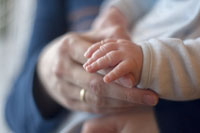UK Wedding News
09/02/2017
 A new study has suggested that first-born children outperform their siblings when it comes to thinking skills because they receive more mental stimulation from their parents in their early years.
A new study has suggested that first-born children outperform their siblings when it comes to thinking skills because they receive more mental stimulation from their parents in their early years.
The research, by economists at the University of Edinburgh, Analysis Group and the University of Sydney, looked at data from the U.S. Children of the National Longitudinal Survey of Youth, a dataset collected by the US Bureau of Labor Statistics.
Almost 5,000 children were observed from pre-birth to age 14 and assessed every two years. The tests included reading recognition, such as matching letters, naming names and reading single words aloud and picture vocabulary assessments.
Additional information was also collected on environmental factors, such as family background and economic conditions.
Researchers applied statistical methods to economic data to analyse how the parental behaviour of the child was related to their test scores. They then used an assessment tool, the Home Observation Measurement of the Environment, to observe parental behaviour, including pre-birth behaviour, such as, smoking and drinking activity during pregnancy, and post-birth behaviour, such as, mental stimulation and emotional support.
The findings revealed that advantages enjoyed by first born siblings start early in life; from just after birth to three years of age. Differences were found to increase slightly with age.
They found that first-borns tended to score higher than their brothers or sisters in IQ tests – even as early as age one. The study added that while all children received the same levels of emotional support, those born first received additional support with tasks that developed thinking skills.
As a result, experts behind the findings said this could help to explain the so-called birth order effect – when children born earlier in a family enjoy better wages and more education in later life.
Interestingly, it was discovered that parents changed their behaviour as subsequent children were born. For example, they offered less mental stimulation to younger siblings, taking part in fewer activities such as reading with the child, crafts and playing musical instruments. Some mothers also took higher risks during the pregnancy of latter-born children, such as increased smoking.
Commenting on the findings, Dr Ana Nuevo-Chiquero, School of Economics, said: "Our results suggests that broad shifts in parental behaviour are a plausible explanation for the observed birth order differences in education and labour market outcomes."
The study is published in the Journal of Human Resources and can be accessed here.
(JP/LM)
20/03/2020
LeToya Luckett-Walker Is Pregnant
Charlotte Crosby Finds New Romance
Lydia Bright Gets Candid About Giving Birth
Lana Del Ray Splits From Boyfriend
Angelica Ross Learns Of Boyfriend's Secret Life
Ashley Graham's Breastfeeding Struggle
Susanna Reid's Mother's Day Plans
Lin-Manuel Miranda Homeschooling Kids
Kristen Bell Speaks Of Pride For Daughters
Prince George & Princess Charlotte Now Homeschooled
First Borns 'Score Higher In IQ Tests' – Study
 A new study has suggested that first-born children outperform their siblings when it comes to thinking skills because they receive more mental stimulation from their parents in their early years.
A new study has suggested that first-born children outperform their siblings when it comes to thinking skills because they receive more mental stimulation from their parents in their early years.
The research, by economists at the University of Edinburgh, Analysis Group and the University of Sydney, looked at data from the U.S. Children of the National Longitudinal Survey of Youth, a dataset collected by the US Bureau of Labor Statistics.
Almost 5,000 children were observed from pre-birth to age 14 and assessed every two years. The tests included reading recognition, such as matching letters, naming names and reading single words aloud and picture vocabulary assessments.
Additional information was also collected on environmental factors, such as family background and economic conditions.
Researchers applied statistical methods to economic data to analyse how the parental behaviour of the child was related to their test scores. They then used an assessment tool, the Home Observation Measurement of the Environment, to observe parental behaviour, including pre-birth behaviour, such as, smoking and drinking activity during pregnancy, and post-birth behaviour, such as, mental stimulation and emotional support.
The findings revealed that advantages enjoyed by first born siblings start early in life; from just after birth to three years of age. Differences were found to increase slightly with age.
They found that first-borns tended to score higher than their brothers or sisters in IQ tests – even as early as age one. The study added that while all children received the same levels of emotional support, those born first received additional support with tasks that developed thinking skills.
As a result, experts behind the findings said this could help to explain the so-called birth order effect – when children born earlier in a family enjoy better wages and more education in later life.
Interestingly, it was discovered that parents changed their behaviour as subsequent children were born. For example, they offered less mental stimulation to younger siblings, taking part in fewer activities such as reading with the child, crafts and playing musical instruments. Some mothers also took higher risks during the pregnancy of latter-born children, such as increased smoking.
Commenting on the findings, Dr Ana Nuevo-Chiquero, School of Economics, said: "Our results suggests that broad shifts in parental behaviour are a plausible explanation for the observed birth order differences in education and labour market outcomes."
The study is published in the Journal of Human Resources and can be accessed here.
(JP/LM)
Top stories
20/03/2020
LeToya Luckett-Walker Is Pregnant
Charlotte Crosby Finds New Romance
Lydia Bright Gets Candid About Giving Birth
Lana Del Ray Splits From Boyfriend
Angelica Ross Learns Of Boyfriend's Secret Life
Ashley Graham's Breastfeeding Struggle
Susanna Reid's Mother's Day Plans
Lin-Manuel Miranda Homeschooling Kids
Kristen Bell Speaks Of Pride For Daughters
Prince George & Princess Charlotte Now Homeschooled











